
-
 Man Utd can fight for Premier League title in next few years: Amorim
Man Utd can fight for Premier League title in next few years: Amorim
-
Pandya blitz powers India to T20 series win over South Africa

-
 Misinformation complicated Brown University shooting probe: police
Misinformation complicated Brown University shooting probe: police
-
IMF approves $206 mn aid to Sri Lanka after Cyclone Ditwah

-
 Stocks advance as markets cheer weak inflation
Stocks advance as markets cheer weak inflation
-
Emery says rising expectations driving red-hot Villa

-
 Three killed in Taipei metro attacks, suspect dead
Three killed in Taipei metro attacks, suspect dead
-
Seven Colombian soldiers killed in guerrilla attack: army

-
 Amorim takes aim at Man Utd youth stars over 'entitlement'
Amorim takes aim at Man Utd youth stars over 'entitlement'
-
Mercosur meets in Brazil, EU eyes January 12 trade deal

-
 US Fed official says no urgency to cut rates, flags distorted data
US Fed official says no urgency to cut rates, flags distorted data
-
Rome to charge visitors for access to Trevi Fountain

-
 Spurs 'not a quick fix' for under-fire Frank
Spurs 'not a quick fix' for under-fire Frank
-
Poland president accuses Ukraine of not appreciating war support

-
 Stocks advance with focus on central banks, tech
Stocks advance with focus on central banks, tech
-
Amorim unfazed by 'Free Mainoo' T-shirt ahead of Villa clash

-
 PSG penalty hero Safonov ended Intercontinental win with broken hand
PSG penalty hero Safonov ended Intercontinental win with broken hand
-
French court rejects Shein suspension

-
 'It's so much fun,' says Vonn as she milks her comeback
'It's so much fun,' says Vonn as she milks her comeback
-
Moscow intent on pressing on in Ukraine: Putin

-
 UN declares famine over in Gaza, says 'situation remains critical'
UN declares famine over in Gaza, says 'situation remains critical'
-
Guardiola 'excited' by Man City future, not pondering exit

-
 Czechs name veteran coach Koubek for World Cup play-offs
Czechs name veteran coach Koubek for World Cup play-offs
-
PSG penalty hero Safonov out until next year with broken hand

-
 Putin says ball in court of Russia's opponents in Ukraine talks
Putin says ball in court of Russia's opponents in Ukraine talks
-
Czech Zabystran upsets Odermatt to claim Val Gardena super-G

-
 NGOs fear 'catastrophic impact' of new Israel registration rules
NGOs fear 'catastrophic impact' of new Israel registration rules
-
US suspends green card lottery after MIT professor, Brown University killings
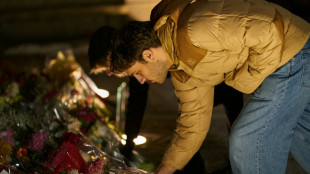
-
 Arsenal in the 'right place' as Arteta marks six years at club
Arsenal in the 'right place' as Arteta marks six years at club
-
Sudan's El-Fasher under the RSF, destroyed and 'full of bodies'

-
 From farms to court, climate-hit communities take on big polluters
From farms to court, climate-hit communities take on big polluters
-
Liverpool have 'moved on' from Salah furore, says upbeat Slot

-
 Norway crown princess likely to undergo lung transplant
Norway crown princess likely to undergo lung transplant
-
Iraq negotiates new coalition under US pressure
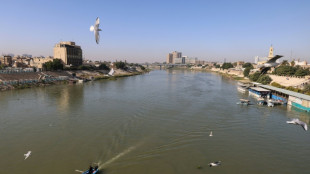
-
 France's budget hits snag in setback for embattled PM
France's budget hits snag in setback for embattled PM
-
Putin hails Ukraine gains, threatens more, in annual press conference

-
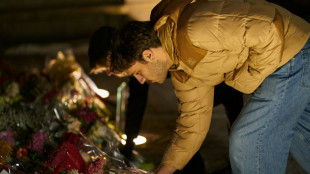 US suspends green card lottery after Brown, MIT professor shootings
US suspends green card lottery after Brown, MIT professor shootings
-
Chelsea's Maresca says Man City link '100 percent' speculation

-
 Dominant Head moves into Bradman territory with fourth Adelaide ton
Dominant Head moves into Bradman territory with fourth Adelaide ton
-
Arsenal battle to stay top of Christmas charts

-
 Mexican low-cost airlines Volaris and Viva agree to merger
Mexican low-cost airlines Volaris and Viva agree to merger
-
Border casinos caught in Thailand-Cambodia crossfire

-
 Australia's Head slams unbeaten 142 to crush England's Ashes hopes
Australia's Head slams unbeaten 142 to crush England's Ashes hopes
-
Epstein files due as US confronts long-delayed reckoning

-
 'Not our enemy': Rush to rearm sparks backlash in east Germany
'Not our enemy': Rush to rearm sparks backlash in east Germany
-
West Indies 110-0, trail by 465, after Conway's epic 227 for New Zealand

-
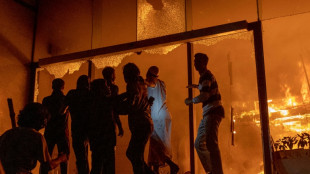 Arsonists target Bangladesh newspapers after student leader's death
Arsonists target Bangladesh newspapers after student leader's death
-
Volatile Oracle shares a proxy for Wall Street's AI jitters
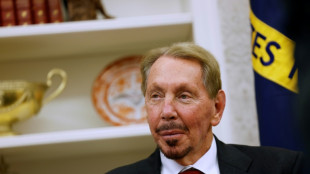
-
 Tears at tribute to firefighter killed in Hong Kong blaze
Tears at tribute to firefighter killed in Hong Kong blaze
-
Seahawks edge Rams in overtime thriller to seize NFC lead


The secret to living to 110? Bad record-keeping, researcher says
Most of what we know about humans living to very old age is based on faulty data, including the science behind the "blue zones" famous for having a high proportion of people over 100, according to one researcher.
The desire to live as long as possible has driven a booming lifestyle industry selling supplements, books, tech and tips to those wanting to learn the secrets of the world's oldest people.
But Saul Justin Newman, a researcher at University College London's Centre for Longitudinal Studies, told AFP that most extreme old age data "is junk to a really shocking degree".
Newman's research, which is currently being peer-reviewed, looked at data about centenarians and supercentenarians -- people who live to 100 and 110 -- in the United States, Italy, England, France and Japan.
Contrary to what one might expect, he found that supercentenarians tended to come from areas with poor health, high levels of poverty -- and bad record-keeping.
The true secret to extreme longevity seems to be to "move where birth certificates are rare, teach your kids pension fraud and start lying", Newman said as he accepted an Ig Nobel prize, a humorous version of the Nobel, in September.
Just one of many examples is Sogen Kato, who was thought to be Japan's oldest living person until his mummified remains were discovered in 2010.
It turned out he had been dead since 1978. His family was arrested for collecting three decades of pensions payments.
The government then launched a review which found that 82 percent of Japan's centenarians -- 230,000 people -- were missing or dead.
"Their paperwork is in order, they're just dead," Newman said.
This illustrates the problem Newman has sought to shine a light on -- that confirming ages in this field involves triple-checking very old documents that could have been wrong from the start.
The industry that has popped up around blue zones is one "symptom" of this problem, he said.
- 'Only alive on pension day' -
Blue zones are regions around the world where people are said to live disproportionately longer and healthier lives.
The term was first used in 2004 by researchers referring to the Italian island of Sardinia.
The following year, National Geographic reporter Dan Buettner wrote a story that added the Japanese islands of Okinawa and the Californian city of Loma Linda.
Buettner admitted to the New York Times in October that he only included Loma Linda because his editor told him: "you need to find America's blue zone".
The reporter teamed up with some demographers to create the Blue Zones lifestyle brand, and they added Costa Rica's Nicoya Peninsula and the Greek island of Ikaria to the list.
However, as seen in Japan, later government records have cast doubt on old age data in these regions.
In Costa Rica, 2008 research showed that 42 percent of centenarians had "lied about their age" in an earlier census, Newman said.
For Greece, he found 2012 data suggesting that 72 percent of the country's centenarians were dead or imaginary.
"They're only alive on pension day," Newman said.
Several prominent blue zone researchers wrote a rebuttal earlier this year, calling Newman's work "ethically and academically irresponsible".
They accused Newman of referring to broader regions of Japan and Sardinia when the blue zones were smaller areas.
The demographers also emphasised they had "meticulously validated" the ages of supercentenarians in blue zones, double-checking historical records and registries dating back to the 1800s.
Newman said this argument illustrated his point.
"If you start with a birth certificate that's wrong, that gets copied to everything, and you get perfectly consistent, perfectly wrong records," he said.
- A clock to measure age -
The only "way out of this quagmire" is to physically measure people's ages, Newman said.
Steve Horvath, an ageing researcher at the University of California, told AFP he had created a new technique called a methylation clock "for the express purpose of validating claims of exceptional longevity".
The clock can "reliably detect instances of severe fraud", such as when a child assumes their parent's identity, but cannot yet tell the difference between a 115- and 120-year-old, he said.
Horvath has offered to test a DNA sample of France's Jeanne Calment, who died at 122 in 1997 and holds the record for the oldest confirmed age.
Newman's analysis "appears to be both rigorous and convincing", Horvath said, adding that several blue zones are overseen by rigorous scientists.
"I suspect both opinions hold some truth," he said.
So what can people at home take away from this debate?
"If you want to live a long time, step number one: don't buy anything," Newman said.
"Listen your GP (doctor), do some exercise, don't drink, don't smoke -- that's it."
Y.Kobayashi--AMWN


